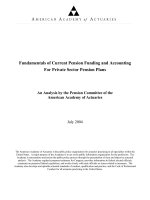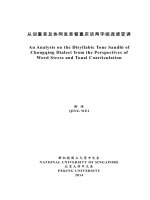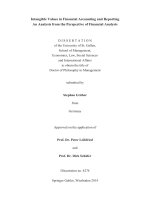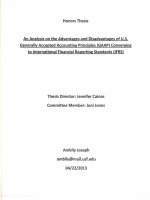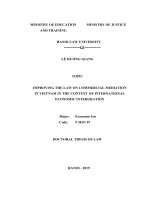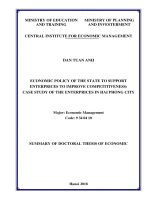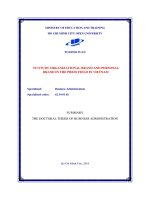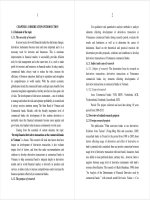Doctoral thesis of philosophy an analysis of the emergence and growth of accountancy profession in developing economies the case of sudan 1956 2010
Bạn đang xem bản rút gọn của tài liệu. Xem và tải ngay bản đầy đủ của tài liệu tại đây (2.27 MB, 336 trang )
AN ANALYSIS OF THE EMERGENCE AND
GROWTH OF ACCOUNTANCY PROFESSION IN
DEVELOPING ECONOMIES:
THE CASE OF SUDAN
1956 - 2010
A thesis submitted in fulfilment of the requirements for the degree of Doctor of Philosophy
Peter Lokaro Ngrimwa
B.Bus, M.Bus
School of Accounting
College of Business
RMIT University
August 2016
Declaration
I certify that except where due acknowledgement has been made, the work is that of the author alone;
the work has not been submitted previously, in whole or in part, to qualify for any other academic
award; the content of the choose an item is the result of work which has been carried out since the
official commencement date of the approved research program; any editorial work, paid or unpaid,
carried out by a third party is acknowledged; and, ethics procedures and guidelines have been
followed.
Peter Lokaro Ngrimwa
4 November 2016
DEDICATION
This doctoral thesis is devoted to my dear late wife FERIDA EFREM MODI who passed
away in Melbourne, Australia. In life, she had always offered me continuous solace in my
moments of disenchantment in general. I also honour my late parents: mother Cecilia Kiden
and my father Karlo Bilal who implanted in me the drive to succeed and educated me to cope
with the complexities of life. Their supportive spirits have inspired me to accomplish this
higher educational achievement. Finally, I would like to make a solemn tribute to my late
sibling Martin Aligo. George Ondogo who disappeared without trace in Sudan since 1992 is
also remembered. Finally, my sibling Angelo Lawya in South Sudan deserves a place of
honour in this Ph.D. accomplishment.
ii
ACKNOWLEDGEMENT
This thesis would not have been accomplished without the focused guidance of my first
supervisor, Associate Professor Prem Yapa who persistently and painstakingly steered me
throughout the length and breadth of this doctoral thesis. I similarly acknowledge the useful
counsels of Dr. Michael Kend, my second supervisor who advised on the trend of my
research work. I also extend my gratitude to my external associate supervisor Professor
Christopher Napier of the Royal Holloway, University of London for his trendy and valuable
advice, especially with regard to perspectives in Islamic corporate institutions. I am also
indebted to Associate Professor Marcia Anisette of the Schulich School of Business, York
University in Canada for the constructive and invaluable criticisms she had made towards the
accomplishment of this thesis. I am likewise indebted to the staff members of the two
Durham University Libraries. Of particular mention are Jane Hogan of the Palace Green
Library, who assisted me to locate the pertinent archival material in the Library; Tony Cleeve
of Bill Bryson Library who photocopied for me useful material for my thesis and Richard
Holmes, who also assisted me by explaining to me the ground rules of how to use the
reference material’s section. All of them made my trip to Durham in England worth
remembering and fortified my resolve to complete this doctoral thesis. Further indebtedness
goes to Mohamed S. A. Haggar, the former Auditor General of the Republic of Sudan, and
currently the principal Partner of Hasibeen Group, Statutory Auditors, Certified Accountants
and Management consultants in Khartoum, Sudan who sent to me valuable archival data from
Sudan. Likewise, Mr. Weiyuan Xin, a senior teacher at Dandenong High School willingly
assisted me in extracting diagrams from some articles used in this doctoral thesis. Finally my
encomiums to Joseph Onen Oreste and Alphonse Liwa Martin who have kept courteous
companionship with me after the passing on of my dear wife.
iii
Table of Contents
DECLARATION……………………………………………………………………
DEDICATION………………………………………………………………………
ACKNOWLEDGEMENT………………………………………………………….
TABLE OF CONTENTS……………………………………………………………
LIST OF TABLES…………………………………………………………………..
LIST OF FIGURES………………………………………………………………...
ACRONYMS AND ABBREVIATIONS……………………..………………….…..
ABSTRACT……………………………………………………………………………
Chapter 1 Introduction
1.1
1.2
1.3
1.4
1.5
1.6
1.7
1.8
1.9
1.10
Background to research
Sudan Setting
Sudan’s Economy Overview
1.3.1 Economic development
1.3.2 Real GDP Growth
Motivation
Conceptual Framework
Research Objectives
Research Questions
Rationale
Methods
Organization of the thesis
I
II
III
IV
VII
VIII
IX
XI
1
1
2
5
5
5
8
11
16
17
18
19
22
25
25
Chapter 2 Literature Review
2.1
Introduction
2.2
The State and the Profession Symbiosis in Relation to the Development of
Accountancy Profession
2.3
A comprehensive review of the literature of the accountancy profession in
Developing countries
2.3.1 The development of the Accounting profession in African countries
2.3.2 Development of the Accounting profession in Asian countries
2.3.3 The development of the accountancy profession in Middle East
2.3.4 The Development of the Accounting profession in the Caribbean Nations
2.4
Professional Accounting Closure
2.4.1 Neo-Weberian Concept
2.5
The International Big Four Accounting and Auditing Companies in Sudan
2.6
Imperialism and Colonialism
2.7
Islamic Perspective in Accounting
2.8
Establishing the Literature Gaps
2.9
Summary of the Literature
2.10 Conclusion
32
35
42
56
65
70
71
75
77
82
85
87
88
Chapter 3 Theoretical and methodological framework
3.1
Introduction
3.2
Emergence of profession
3.3
Definition of professionalization
3.4
Professionalization Process
90
90
91
94
96
iv
26
3.5
The sociology of the professions (SOP)
102
3.6
3.7
3.5.1 Functionalism, Interactionist and Critical Perspectives in SOP
Conceptual Framework
Conclusion
106
112
113
Chapter 4 Research Methodology and Methods
4.1
Introduction
4.2
Research Methodology
4.2.1 Methodology Choices of Laughlin
4.2.2 Theorization in Accounting Qualitative Research
4.3
Research Methods
4.3.1 Semi-structured interviews
4.3.2 Process for collecting Data
4.3.3 Background to Participants
4.3.4 5The Validation of Data
1374.3.5 Archival Data
4.3.6 Secondary Data
4.3.7 Analysis of Data
4.4
Process and Analysis of Data
4.5
Conclusion
114
114
115
117
122
127
132
133
135
137
139
140
141
142
144
Chapter 5 The political and economic dynamics in post-independence Sudan
5.1
Introduction
5.2
Sudan’s Contextual Setting
5.3
Sudan’s colonial economy
5.4
The evolution of Sudan’s accountancy profession: IAS
5.4.1 The setting of the IAS
5.4.2 Outmoded Sudan’s Companies Act 1925
5.4.3 Political regimes and their policy orientation: 1956-2010
5.4.4 The Sudanese professional accounting association (SCCA) 1980s
5.4.5 Overview of the progress of the SCCA
5.4.6 Council Regulating the Accountancy Profession in the Sudan
5.5
The multinational oil companies and the accountancy profession in the Sudan
5.6
The state influence, Islamic shari’a and the accountancy profession
5.6.1 The Islamization of the financial system in Sudan
5.6.2 What is shari’a?
5.6.3 Difference between Islamic sharia system and Western secular system
5.7
The shari’a versus secular state
5.8
Summary
145
146
155
160
161
161
166
168
171
173
175
Chapter 6 The Accountancy Profession in Sudan: 1956-2010
6.1
Introduction
6.2
The Accounting profession was regulated by the state: 2004-2010
6.3
The Sudan Accounting and Auditing Profession Organization Council
6.4
The Role of the CBOS and Implementation of Islamic shari’a in Sudan
6.4.1 The differences between IASB and AAOIFI
6.5
The Islamic perspective in a Sudanese state institution: The MoFNE
6.6
The International Standards issued by the IFRS
6.7
The domination of accounting profession by the ACCA
v
179
186
187
187
192
195
197
199
199
200
204
213
219
222
223
224
6.8
6.9
6.10
6.11
6.12
6.7.1 Arabicized System of Education in the Sudan
6.7.2The ACCA offers courses and Examinations in English in Sudan
6.7.3 SCCA-ACCA Joint Examinations Council
The Sudanese state ideology and the political process towards the accounting
And finance institutional environment
The discovery of oil and its contribution to the accounting and auditing services
in the Sudan
The influence of the BiG 4 companies in the Sudan
The influence of the IAS and the adoption of IFRS
Summary
225
226
227
229
230
233
234
236
Chapter 7 Findings and Discussions
7.1
Introduction
7.2
The accounting profession and the state between 1988 and 2010
7.2.1 The role and involvement of the SCCA in the profession
7.2.2 The role and involvement of ASCA in the Sudan
7.3
The role of the SAAPOC: 2004
7.4
The CBOS, the Banking Act 1992 and the implementation of Islamic shari’a
7.5
Islamic perspective in Sudanese state institutions
7.6
Findings on the state and the accounting profession
7.7
The influence of the Bahraini-based AAOIFI
7.8
Secular British ACCA and its strategy to dominate the Sudanese market
7.9
The ideology of the Republic of Sudan is predominantly Sunni Muslim
7.10 The discovery of oil and gas and the impact on the accounting and auditing
Services in the Sudan
7.11 The BiG 4 in accounting industry and the influences of international
accounting agencies
7.12 The influence of international accounting standards
7.13 Theoretical Implications
7.14 Summary
242
242
243
245
247
248
251
253
254
255
258
260
8 Conclusion and Implications
8.1
Introduction
8.2
Summary of the thesis
8.3
Implications
8.4
Limitations of the study
8.5
Suggestions for future research
8.6
Conclusion
REFERENCES
APPENDICES LIST
274
274
274
280
282
283
283
287
302
vi
261
264
265
266
269
List of tables
Table 1.1
Basic Data on Sudan’s economy (2010)
5
Table 1.2
Sudan’s Demographic Data Overview
5
Table 2.1
Countries dominated by the ACCA, the CPA and other Systems
68
Table 2.3
Classification of Accounting System by Dominant Influence
78
Table 4.1
Dimensions on the Choice Process for Empirical Research
113
Table 4.2
Key Characteristics of Theory, Methodology and Change
115
Table 4.3
Levels of Theory Relating to Different Empirical Issues
116
Table 4.4
Different Types of Research
121
Table 4.5
Critical factors influencing the development of the profession in Sudan
133
Table 4.6
Summary of interview participants
137
Table 5.1
Major Cotton Irrigation Schemes in the Sudan
156
Table 5.2
Terms of Reference for expatriate advisors
161
Table 5.3
Political regimes and their policy orientation in Sudan: 1959-2010
167
Table 5.5
SCCA Education Committees
175
Table 7.1
Link between critical factors and the interviewees’ answers provided
267
vii
List of Figures
Figure 1.1
Post-independence Period covered by research (1956-2010)
10
Figure 1.2
Conceptual framework
14
Figure 2.1
Diagram on Professional Closure
73
Figure 3.1
Professionalization Traits
98
Figure 3.2
The professionalization process
99
Figure 3.3
Emergence of the sociology of the professions
103
Figure 4.1
Dimensions on the Choice Process for Empirical Research
113
Figure 4.2
Stages of Data Analysis Process
139
Figure 4.3
The Research Questions and Themes
139
Figure 5.1
The map of Sudan
145
Figure 5.2
The Organizational chart of the SCCA
172
Figure 5.3
The country Comparison of crude oil in Sub-Saharan Africa
177
Figure 5.4
Growth of GDP and GDP per Capita [1990-2008]
178
Figure 5.5
The authoritative sources from which Islamic is derived
185
Figure 5.5
The fundamental institutions in an Islamic state
192
Figure 6.1
The tripatite link
228
Figure 7.1
Research questions and Findings
242
Figure 8.1
Chapters Outline of the Thesis
248
Figure 8.2
Overview of the accountancy profession in the Sudan
250
viii
Acronyms and abbreviations
AAOIFI
Accounting and Auditing Organization for Islamic Financial Institutions
AAPA
American Association of Public Accountants
ACCA
Association of Chartered Certified Accountants
AGC
Auditor General’s Chamber
A.I.C.P.A.
American Institute of Certified Public Accountants
CIMA
Chartered Institute of Management Accountants
AIP
Accounting from Islamic Perspective
AL
Arab League (Sudan is a member of the Arab League countries)
ASCA
Arab Society of Certified Accountants
SAAPOC
Sudan Accounting and Auditing Professions Organization Council (Sudan)
CBS
Central Bank of Sudan
CIBAFI
Council for Islamic Banks and Financial Institutions
CICPA
Chinese Institute of Certified Public Accountants
CIPFA
Chartered Institute of Public Finance and Accountancy
CNPC
China National Petroleum Corporation
COMESA
Common Market for Eastern and Southern Africa
CPA
Certified Public Accountants (America)
CPA
Comprehensive Peace Agreement (Sudan-South Sudan)
EPAAA
Ethiopian Professional Association of Accountants and Auditors
EU
European Union
FAP
Federation of Accounting Professions
FDI
Foreign Direct Investment
GDP
Gross Domestic Product (GDP per capita)
GNPOC
Greater Nile Petroleum Operating Company
GONU
Government of National Unity
GOS
Government of Sudan
GPUAA
General Professional Union of Accountants and Auditors
HSCC
Higher Shari’a Control Commission (Operate under the CBS)
HSSB
High Shari’a Supervisory Board
IAS
Institute of Accounting Studies (Sudan)
ICAEW
Institute of Chartered Accountants in England and Wales
ICAI
Institute of Chartered Accountants in Ireland
ix
ICAJ
Institute of Chartered Accountants of Jamaica
ICAS
Institute of Chartered Accountants of Scotland
IDA
International Development Association
IDB
Islamic Development Bank
IFAC
International Federation of Accountants
IFRS
International Financial Reporting Standards
ILO
International Labour Organization
IMF
International Monetary Fund
IOSCO
International Organization of Securities Commissions
ISAB
International Accounting Standard Board
MENA
Middle East and North Africa: the region that consists of 11 Arab countries,
namely: Bahrain, Jordan, Egypt, Kuwait, Lebanon, Morocco, Oman, Qatar,
Saudi Arabia, Tunisia and United Arab Emirates.
MoESR
Ministry of Education and Scientific Research
MoFNE
Ministry of Finance and National Economy
MoHRDL
Ministry of Human Resources Development and Labour
NAC
National Audit Chamber (Sudan)
NCP
National Congress Party (The ruling political Party in Sudan since 1989)
OIC
Organization of Islamic Countries
ONGC
Oil and Natural Gas Corporation
RSS
Republic of South Sudan
PETRONAS Petroleum Nasional Berhad (Malaysian Oil and Gas Company)
ROSC
Reports on the Observance of Standards and Codes (World Bank)
SAAPOC
The Sudan Council of Accounting and Auditing professions Organization
SAI
Supreme Audit Institutions
SCCA
Sudan Council of Certified Accountants
SOP
Sociology of Profession
SPC
Sudanese Petroleum Corporation
SPLA/M
Sudan Peoples’ Liberation Army/Movement
SMO
Statement of Membership Obligation (IFAC)
SSE
Sudan Stock Exchange
UNDP
United Nations Development Programme
USAID
United States Agency for International Development
WB
World Bank
x
Abstract
This is an empirical investigation into the development of the accounting profession in the
Republic of Sudan in the post-independence era (1956-2010) as a qualitative case study,
taking into note the local accountancy association, the Sudan Council of Certified
Accountants (SCCA) which was established in the late 1980s, as well as the Arab Society of
Certified Accountants (ASCA) which was first established in 1984 as a non-profit
professional accounting association in London, UK. The theoretical framework of this study
is drawn from the sociology of the profession (SOP) including the state and the profession
framework. Laughlin (1995) and Llewellyn’s (2003) methodological constructions on
qualitative accounting research been employed in the study. This study uses a combination
of archival, secondary, as well as in-depth interview data, the influence of state-profession
symbiosis on the growth of the accounting profession in the Sudan. The most salient trend in
the nearly six decades since Sudan gained political independence from her colonial master
has been the persistent presence of the country’s military at the apex of the nation, virtually
undermining and diminishing all traces of democratic practices, thus impacting on all
political and professional institutions in the country, as well as emasculating the sociocultural and economic facets of the lives of the ordinary Sudanese citizens - a setting that had
fuelled the pervasive civil wars over the years and had steered Sudan to the subsequent
partition of the former largest country in Africa into two independent states in 2011.
The study conceptualizes the process of state and the accountancy profession as a
series of interactions between occupational associations and various social institutions, in
relation to a particular set of conditions. In this perspective, the interactions involve
negotiation, posturing, confrontation, conflict and conciliation; other social institutions
include the State, corporations and higher education.
This study found that Sudan’s connection with Britain and the continuing British
interests in the post-independence period have significantly impacted upon Sudan’s business,
social, political and educational spheres. The British-based Association of Chartered Certified
Accountants (ACCA) is dominating in the accounting profession in the Sudan despite the
existence of the country’s local accountancy associations. This study also found that albeit
Sudan inherited its Anglo-Saxon accounting system from Britain, the presence of the ASCA
and the Accounting and Auditing Organization for Islamic Financial Institutions (AAOIFI),
the adoption of Islamic Shari’a by the Sudanese Parliament in 1983 as well as the
Islamization of the country’s economy and the financial sector in 1992 through the Central
Bank of Sudan (CBS), Ministry of Finance and National Economy (MoFNE), Ministry of
Human Resources Development and Labour (MoHRDL) has created a unique feature (i.e
Islamic perspective ) in the accounting profession when compared to former British colonies.
The unique finding of accounting profession in Sudan is that while many former British
colonies contested for localization of accounting based on their national ethos, interestingly,
Sudanese accounting profession associated with religious path in developing the profession.
xi
Chapter 1: Introduction
1.1 Introduction: Background to research
This chapter explains the development of the accountancy profession in the Sudan in a span
of time stretching over five decades (1956-2010). It is an empirical investigation into the
development of the accounting profession in the Republic of Sudan in the post-independence
era and presented as a case study under state-profession relationship. The study further
informs how the dynamics of state-profession interactions, structure of the economy, the role
of the state in accommodating both Islamic and secular perspectives in the country,
interactions between the state and global forces, and attributes of the aspiring associations
that have impacted on the professionalization endeavour. Besides, the study also
encompasses the local accountancy association, the Sudan Council of Certified Accountants
(SCCA) which was set up in the late 1980s; the British-based Association of Chartered
Certified Accountants (ACCA), its legacy and impact in terms of the development of the
accounting profession in the Sudan; the Arab Society of Certified Accountants (ASCA) set
up in 1984 and finally, the advent of the Islamic accounting perspectives (IAP) on the
corporate scene in the Sudan, that involves the Accounting and Auditing Professions for
Islamic Financial Institution (AAOIFI) in a single case study.
The study researches the state and the accounting professionalization process in the
Republic of Sudan during the past five decades (1956-2010), and further, conceptualizes the
process of state and the accountancy profession as a series of interactions between
occupational associations and various social institutions in relation to a particular set of
conditions. The interactions involve negotiation, posturing, confrontation, conflicts and
conciliation of these various interest group. Furthermore, other important social institutional
actors include the State, corporations and higher education.
1
The theoretical framework of this research project is drawn from the sociology of the
professions including the state and the profession framework. Thus, the main data collection
for this research was through semi-structured interviews and archival records. In addition,
secondary sources such as published articles, relevant legislation, government reports, books
and websites were reviewed. Like in all other colonies and dominions across the globe, Great
Britain was similarly involved in shaping the accountancy profession during the
condominium period in the Sudan (1898-1956).
This chapter has been structured as follows: Section 1.2 presents Sudan’s historical,
geographical, cultural and political setting dating back to the colonial era, while section 1.3
shows an overview of the country’s economy including the oil resource and agriculture that
has remained the mainstay of Sudan’s economy. Section 1.4 explains the motivation for this
research study, and section 1.5 exhibits the conceptual framework while the research
objectives come under section 1.6 and then followed by the research question Sections 1.7
and 1.8 provide the rationale for the study and section 1.9 presents the methodology applied
in the research, and section 1.10 concludes the chapter with the organization of the thesis.
1.2 Sudan Setting
Perhaps the most salient trend in the fifty-four years from 1956 to 2010 since Sudan gained
political independence from British colonial rule has been the persistent presence of the
country’s military at the apex of the nation, virtually undermining and diminishing all traces
of democratic practices, thus impacting on all political and professional institutions including
the accountancy profession in the country, as well as emasculating the socio-cultural and
economic facets of the lives of the ordinary Sudanese citizens - a setting that had fueled the
pervasive civil wars over the years and had steered Sudan to the subsequent partition of the
former largest country in Africa into two independent states (South and North) in 2011.
2
Conceivably an important question to propound at this juncture would be as to how the
various seemingly diametrically opposed and conflicting “interest” parties such as the
accountancy bodies mentioned above, with perhaps irreconcilable agendas could be
accommodated under one roof of the state’s regulatory jurisdiction. The response to this
probe would certainly contribute colossally to the understanding of the accounting profession
in the Sudan. The study likewise builds upon the somewhat inadequate literature in the
domain of “accountancy professionalization in emerging economies” and attempts to enlarge
this area for future research interests which would shade more light on the development of
the accountancy profession in the Sudan within the framework of state-profession symbiosis.
Located in North East of Africa, Sudan 1 acquired its name from the skin colour of its
inhabitants, hence “bilad al- Soudan 2”, for lands of the blacks, as christened by Medieval
Arabs (Abd Al-Rahim, 1970, p. 237; Al-Naqar, 1969; Brett, 1983). The Sudanese state had
existed as the largest country on the African continent by land mass, before the secession of
the Republic of South Sudan from the country in 2011, following five decades of devastating
civil war. It is worth of mention that there are political and racial complexities that shape the
dynamic of the country at the moment that are embedded in the turbulent history of the Sudan
seldom explored by anyone in the country (Collins, 1976).
1
1 Sudan is a developing country; it split into two independent states in 2011 following five decades of
internecine armed conflicts. The secession of South Sudan from the Sudan was the culmination of the successful
implementation of the Comprehensive Peace Agreement (CPA) concluded in 2005 between the government of
Sudan and the Sudan people’s Liberation Movement (SPLM) in context of that conflict. Sudan’s population is
37,159,349 (2012 est.) and a gross domestic product (GDP) of $58, 768,800,833 (2012); a growth rate of -10 per
cent with inflation rate of 37.3 per cent (2012). Life expectancy is 61 years.
2
2 Bilad al-Sudan is, literally, the 'Land of the Blacks', which, in classical Arabic terminology, denoted the belt
south of the Sahara and between the Atlantic and the Nile, which is inhabited by black peoples.
3
Sudan has two divergent races: the African which constitutes 60 per cent of the population of
the country (before the secession of South Sudan in July 2011) and the Arab 3 that makes up
the remaining 40 per cent. It is likewise important to note that both ‘race’ and ‘religion’ are
key elements that have shaped the country’s societal construct, defining the power base in the
country, and have been all along a single contributory factor in exacerbating the long and
interlocking civil wars that lasted for five decades between the African population in the
Southern part of the country and the Arab rulers that inhabit the northern sector of the Sudan.
Two salient features define the former Africa’s largest country, one natural and the
other artificial. The world’s longest river (4,000 miles) emerges from Lake Victoria in
Uganda and runs through Sudan before ending in the Mediterranean Sea. The artificial
element has been the persistent and decimating civil wars that have turned the country into a
large battle field, and the debacle began in August 1955 between the Arab Muslim north and
the Christian African south of Sudan in which over two million people died in Southern
Sudan when the guns finally went silent in 2005, following the peaceful settlement of the
conflict that culminated in the Comprehensive Peace Agreement (CPA), yet other sporadic
armed confrontations still persist unabated in various regions of the country between the
central government in Khartoum and the peripheral areas of the state to this date.
3
Arab Muslim migrations to the Sudan took place in the 13th-15th centuries from both Egypt and the Arabian
Peninsula. Intermarriage of Arabs with people from local tribes Islamicized large portions of northern Sudan in
both religion and law (Collins, 1976), however the group still remains in the minority
4
1.3 Sudan’s Economy Overview
The economy of Sudan is classified as developing. It depends wholly on Agriculture
which is largely traditional and less mechanized. This sector is the mainstay of the country’s
economy. Since Sudan attained its political independence in 1956, the country has
experienced shifts in economic systems- capitalist in the 1950s to socialist system in the
1970s to Islamic from the 1980s to the year 2010. Despite these swings in the economic
systems, Sudan’s economy is still struggling with high rates of inflation, trade deficits and
depressed levels of income as well as foreign debt crisis (Mohsin, 2002).
1.3.1 Economic Developments
Sudan has implemented a range of macroeconomic and structural reforms over the past
decade under successive IMF Staff Monitored Programmes (SMPs). These reforms included
the adoption of banking sector reforms, liberalization of the exchange system and other
structural measures. They contributed to restoring macroeconomic and financial stability,
thereby creating the condition for sustained growth in the country.
1.3.2 Real GDP growth
The real GDP growth in Sudan has been largely driven by high production of oil, rising
Foreign Direct Investment (FDI) inflows and Government investment to some extent.
However, real GDP growth slowed down from 6.8% in 2008 to 4.5 % in 2009; as a result of
the global crisis and the decline in international oil prices (refer to Annex II). With recovery
in the oil prices and world economy, FDI inflows and the ongoing reforms, real GDP growth
was expected to rebound to 5.5% in 2010. Average annual inflation fell from 14 % in 2008 to
11% in 2009, and was anticipated to drop to 10% in 2010 (African Development Group,
2010/2011).
5
It was in the second half of 2008, when Sudan's economy boomed on the back of
increases in oil production, high oil prices, and large inflows of foreign direct investment.
GDP growth registered more than 10% per year in 2006 and 2007. Basic economic data and
demographic overview in 2010 are presented in Table 1.1 and Table 1.2. From 1997 to date,
Sudan has been working with the International Monetary Fund (IMF) to implement
macroeconomic reforms, including a managed float of the exchange rate. Sudan began
exporting crude oil in the last quarter of 1999. Agricultural production remains important,
because it employs 80 per cent of the work force and contributes a third of GDP. The Darfur
conflict, the aftermath of two decades of civil war in the south, the lack of basic infrastructure
in large areas, and a reliance by much of the population on subsistence agriculture ensure
much of the population remain at or below the poverty line for years despite rapid rises in
average per capita income. In January 2007, the government introduced a new currency, the
Sudanese Pound, at an initial exchange rate of $1.00 equals 2 Sudanese Pounds.
Table 1.1 Basic Data on Sudan’s economy (2010)
GDP
Income per Capita
Inflation
Natural Resources
Agriculture
Industry
Foreign Trade: Imports
Exports
Currency Exchange Rate
$88.95 billion
$2,200
16.5
Petroleum, Natural gas, gold, copper
32.2 per cent of GDP
36 percent of GDP
$7.757 billion
$13.62 billion
$2.28 Sudanese Pounds = $1USD (January 2009)
Sources: CIA World Fact book, 2008, World Bank, US Department of State.
Table 1.2 Demographic profile overview (2010)
Population of Sudan
Population of Negroid extraction
Arabs
Beja
Others
41 million
52 per cent of the total population pf the country
39 per cent
6 per cent
3 per cent
6
Sudan has significant natural resources, but since independence its economy has been
constrained by civil war, debt, and mismanagement. Although it has recently turned its
economy around with sound economic policies and infrastructure investments, it still faces
formidable economic problems, one of them being the low level of per capita output. Since
1997 Sudan has been implementing IMF macroeconomic reforms. In 1999 Sudan began
exporting crude oil and in the last quarter of 1999 recorded its first trade surplus, which,
along with improvement s in monetary policy, has stabilized the exchange rate. Increased oil
production, revived light industry, and expanded export processing zones yielded gross
domestic product (GDP) growth of an estimated 5.9 percent in 2003.
Agriculture remains Sudan's most important sector of the economy; however, most
farming is rain fed and susceptible to drought. Oil production continues to rise annually and
in 2003 constituted more than 80 percent of export earnings. Chronic instability, including
the long-standing civil war between the Muslim North and the Christian South, the rebellion
in Darfur that broke out in 2003 (Sharkey, 2008), adverse weather, and weak world
agricultural prices ensure that much of the population of the country remains at or below the
poverty line. Sudan also suffers from endemic corruption, an undeveloped and neglected
physical infrastructure, and a financial system still in need of major reform.
Wealth is concentrated in the central Nile corridor region, the northern, eastern,
southern, and western regions being markedly less prosperous. Gross Domestic Product
(GDP): GDP was US$12 billion in 2001 and was estimated at US$13.4 billion in 2002 and
US$15.4 billion in 2003. Per capita GDP was about US$415 in 2002. Since 1999, economic
growth has averaged about 6 percent annually, helping account for an estimated doubling in
the size of the economy between 1996 and 2003. In 2003 estimates, GDP by sector was:
agriculture, 39 percent; industry, 19 percent; and services, 4 percent 4.
4
Library of Congress– Federal Research Division Country Profile: Sudan, December 2004
7
1.4 Motivation
The evolution of the accounting profession and practices in emerging economies owe
their origin to colonial involvements in the past and in the aftermath of post-independence
indigenous rule in these emerging economies. The advent and development of the accounting
profession in the English-speaking world was evidently linked to British imperialism in its
scramble for colonies and Empire-building at the turn of the 19 century and the beginning of
the 20 century (Johnson & Caygil, 1971; Johnson, 1982). The colonial powers had simply left
their legacies behind and continued to influence the development of the accounting and other
professions in these countries through various approaches including the setting up of their
professional accountancy bodies. Some of these countries adopted the colonial accounting
systems but with modifications fine-tuned to the idiosyncrasies of their particular local
environments. The Sudan’s Companies Act 1925 and other corporate regulatory regimes that
still exist today in the country are British colonial legacies.
This study examines the professionalization of accounting process in the Sudan in the
aftermath of the country’s independence from Britain from 1956 to 2010, accentuating the
various professional wrangles and the conflicting boundary lines within the profession as well
as the influence of the British professional accounting institutions on the local and regional
professional accounting bodies in the context of state-profession symbiosis. Albeit Sudan
secured its political independence in 1956, the legislation that formally established the
accounting profession in the country was enacted in the country’s Parliament in 1988; hence
the researcher deems that the Certified Accountants Act 1988 that deals with the formation of
the accounting profession in the Sudan represents a milestone in the process of
Sourced 19 Sept. 2015
8
professionalization of accounting in the country. The Figure 1.1 shows the project research
timeline that depicts the framework of the study.
At this juncture, it is worthwhile to note that the those accountants possessing British
qualifications such as the ACCA are characterized by supremacist tendencies and they
consider themselves an ‘elite-class’ while the graduates from the local SCCA are regarded as
‘non-elite’ or second grade accountants, leading to the marginalization of the latter group.
Furthermore, the presence of the ASCA and the AAOIFI in the Sudanese accounting
profession makes an interesting scenario for the researcher to undertake this research study.
The adoption of Islamic Shari’a (Islamic Law) by Sudan’s Parliament in 1983 as well as the
Islamization of the country’s economy and the financial sector in 1992 through the CBOS is
an added impetus to this research. In addition to this, the major international accounting and
audit firms that regularly travel to Sudan to conduct audit work for multinational corporate
entities and non-governmental organisations normally use conventional accounting system as
opposed to the Islamic accounting system linked to the Bahraini-based AAOIFI. This study
will find out how the accounting profession in the Sudan copes with the pressure emanating
from both systems – Islamic and conventional. The overall consideration is given to the
importance of improving the accounting and auditing systems so as to assist in the economic
development of the country.
As shown below in the research project’s historical setting, Figure 1.1 exhibits the
historical developments from the beginning of the Condominium period in 1899 up to 2010 at
the threshold of the secession of the Republic of South Sudan. The Figure 1.1 notes the break
of the first civil war in the country in 1955 prior to the granting of political independence to
Sudan in 1956. The first military coup in 1958 ushered in the beginning of state sanctioned
religious discrimination through what was known as the Missionary Act 1962 in which the
military government restricted Christianity and persecuted church leaders beginning from
9
1962. Moreover, in 1958 following the coup d’état was also the birth of Sudan’s Institute of
Accounting Studies (IAS). The IAS was founded by Sudan’s government to provide
professional training for bookkeepers and accountants in the country after independence. The
Figure 1.1 also depicts Sudan’s second coup staged by the country’s powerful military in
1969, then there was the discovery and exploitation of Sudanese oil resource since 1978 by
Chevron Company of USA (Standard Oil of California) that made an important contribution
to the national economy, but had also fueled the intermittent five decade civil war in the
country that continued from 1983 and consequently led to the secession of the Republic of
South Sudan in 2011. While the SCCA was created by a Certified Accountants Act in 1988,
the Sudan Council of Accounting and Auditing professions Organization (SAAPOC) Act was
established in 2004 to replace the Act of 1988. Sudan’s oil industry has attracted a number of
major multinational companies that invested in the industry including Asian, European and
Canadian companies. The oil became the major contributor of instability that led to
unprecedented human rights abuses in Africa.
10
Figure 1.1 Sudan’s Historical setting: The Post-independence Period covered by the
research (1956-2010)
Accounting setting (1988-2010)
1958 1962
1969
1978 1983 1988
1989
2004
Condominium Administration
Civil war between South Sudanese Africans and northern Arabs
(Joint British & Egyptian rule)
[1955-2005] led to split of Sudan into two countries in 2011
1.5 Conceptual Framework
Sudan being one of the former colonies of the UK, the accounting profession in the
country was premised on the British conventional accounting system, and fostered by those
‘elite’-group that possess British accounting qualifications. The aim of this study is to explore
the connections among the various parties – the state and the occupational groups in relation
to the professionalization process in the Sudan. As shown in the conceptual frameworks
below, the colonial influence is seen in the continuing application of the Sudan’s Companies
Act 1925 alongside other corporate regulatory practices. The proliferation of the influences of
the ACCA, the Institute of Chartered Accountants in England and Wales (ICAEW), and
Chartered Institute of Management Accountants (CIMA) through the professional courses
managed and run by the British Council in Sudan adds to the entrenched British colonial
11
Independence of South Sudan, 2011
Sudan’s second North-South civil war
Islamic shari’a in Sudan
1956
r
SAAPOC 2004
Sudan’s second military coup
Sudan’s first military coup
1955
IAS 1958
Independence
1899
Missionary Act 1962
Sudan’s first North-South civil war
Mahdia era
British reconquest of Sudan
Condominium Era,
1899-1954
Sudan’s third military coup
Banking Act 1992
First discovery of oil in Sudan (1978)
Sudan’s first accountancy body set up
Historical and political setting (1898-2010)
influence but contributes immensely to the development of the accounting profession in the
country. In analyzing the process of professionalization in the country, regard should be had
on the state-profession symbiosis. The state involvement in the accounting profession is
through the Ministry of Finance and National Economy (MoFNE) as well as the Ministry of
Education and Scientific Research (MoESR). It is important to specifically note that the
University accreditation has played a vanguard role in the development of the accounting
profession in the Sudan. Other contributors to the emergence of the profession are the global
oil corporations that moved to Sudan in the 1990s, following the discovery and exploitation
of the oil resource in the country. These multinational companies including the Big Four
accountancy firms have employed international accounting and auditing standards or
standards applicable in their respective countries in the Sudan, as opposed to the Islamic
perspectives employed by the AAOIFI corporate entities.
Furthermore, by adhering and conforming to the International Accounting Standard
Board’s (IASBs) pronouncements, the International Accounting Standards (IASs) and the
International Financial Reporting Standards (IFRS), the accession has placed Sudan on the
path of synchronizing its accounting and auditing practices with that of the global system,
thus creating a positive environment towards the development of the accounting profession in
the country. This conceptual framework (Figure 1.2) was framed by the researcher based on
the literature and experience of accounting in the Sudan, and it was intended to guide the
researcher to examine the development of the accounting profession in the Sudan. The
emergence and development of the Sudanese accountancy profession from 1956 to 2010
involves various actors and perspectives. The creation of the Institute of Accountants back in
1958 under the supervision of the former Ministry of Finance and Economic Planning was
paramount in the professionalization project. Likewise, the creation of the Sudan’s Council of
Certified Accountants through the Parliamentary legislative Act of 1988 did shape the
12
direction of the accounting profession in the country. However, the influences of the British
professional bodies like the ACCA have played a remarkable role in the accounting
profession in the Sudan.
Other colonial influences as seen in Figure 1.2 include the Sudan Companies Act
1925 that exists to date, the Bill of Exchange Act 1917 and the Insolvency Act 1929. In the
figure the state exercises control through various state agencies such as the Ministry of
Finance and the Universities in the Sudan that became indispensable in that they provide
training for accountants for both public and private sectors. The SAAPOC formulates policies
that involve training and examinations, as well as accreditation in addition to maintaining
links with Universities.
It is worthwhile acknowledging the existence of both economic and political
environment in the Sudan as they tend to impact on the development of accountancy
profession. The relationship between the economic environment and accounting has
been the subject of sizeable accounting literature; (Mueller 1967; Nair and Frank,
1980; Belkaoui, 1983, Choi and Mueller 1984, Arpen and Radebaugh, 1985, Belkauoi,
1985; Nobes, 1988; Adhikari, Tondkar, 1992). It is argued that factors such as type of
economic system, stage of economic development, growth pattern of an economy,
extent of government intervention and expenditures, inflation, level of exports, size and
complexity of business firms, nature of business ownership, sources of funds and stage
of development of capital markets can exert an important influence on the accounting
practices of a country. It is however important to emphasize that the type of economic
system is one of the key determinants of the status of the accounting system in general and
financial reporting and disclosure in particular. While the political factors have been cited by
a number of authors as one of the determinants of the financial reporting systems and
practices (Belkaoui, 1983; Choi and Mueller, 1984; Radebaugh and Gray, 1993; and Nobes,
13

